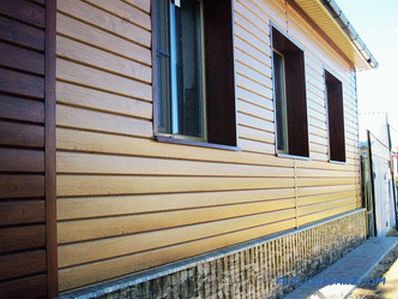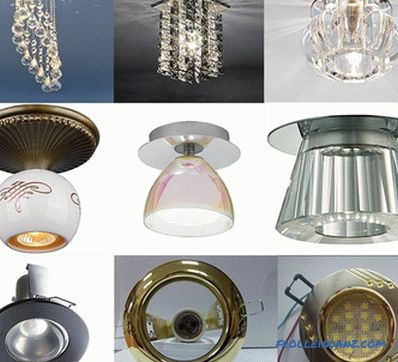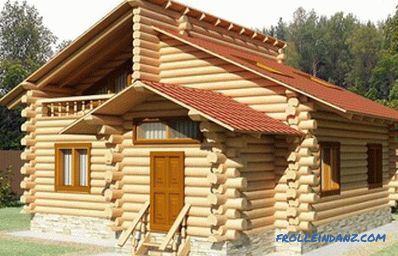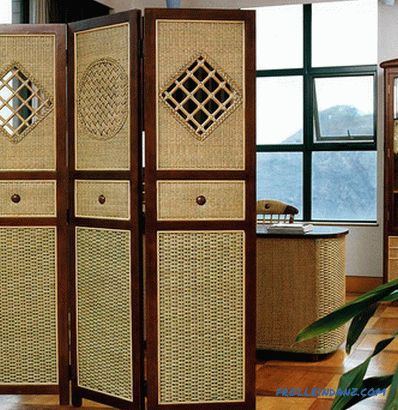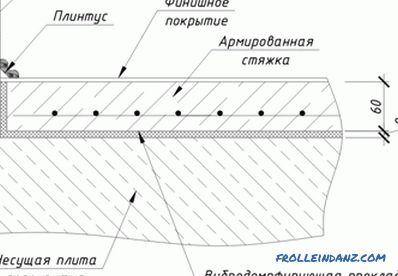The wastewater that comes from your home goes into the sewer system. If you live in a high-rise building, then you have such a centralized system. Residents of private houses are forced to make their own sewage system: dig a cesspool or install a septic tank. Without them, simply can not do. As you know, sewage emit an unpleasant odor that can penetrate your home. Especially this organic gas is intensively released in the summer under the influence of the sun. Therefore, every tenant should think about the device ventilation system.
Variants of the ventilation device
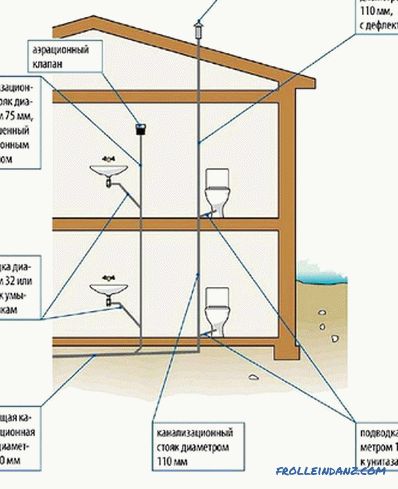 Sewage scheme with a vent pipe outlet
Sewage scheme with a vent pipe outlet
Advantages:
- Balanced system pressure.
- Supply of fresh air and its circulation through the sewer system.
- No unpleasant sound of water suction in areas of low pressure.
Sewage ventilation can be performed regardless of the number of floors and drain points. The main task is to make the scheme correctly. There are two suitable options:
- System using a funnel pipe;
- System using vacuum valves.
To make a choice, you need to consider all the nuances of installing systems. When installing a funnel pipe, it is important to observe the obligatory conditions:
- the house should have several floors, where the discharge points are located above the 1st floor;
- the risers should be more than 50 mm in diameter;
- the sump should be close to the house.
In other cases, the homeowner may choose a simple ventilation system using vacuum valves. But, as experts say, the level of efficiency of the sewage system is markedly reduced if only such valves are used. Since such equipment cannot be a full replacement for a funnel pipe, the homeowner must decide for himself whether he needs ventilation of the sewer riser using the funnel pipe, even if it is not necessary according to the rules. After all, using only vacuum valves to completely prevent the penetration of odor into the house will not work.
The combination of these two options will be most effective. You can install a sewer pipe and equip the sewer with a vacuum valve. It will be very helpful if the fan pipe freezes.
Ventilation with a fan pipe
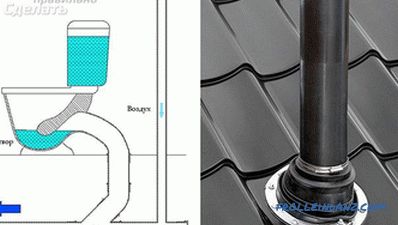
If we are talking about a fan pipe, you can add to the general advantages the correctness of the sewage system. In case of drying of the siphon (hydraulic seal), an unpleasant smell will not penetrate into the house. What does this mean?
 Trap device A siphon or trap is a barrier that prevents odor from entering a house. It is a curved pipe or canal that is filled with water, moving away from sinks, bathtubs and toilet bowls. In the case of drying of the water seal, when the plumbing has not been used for a long time, the sewage odor will penetrate into your house. If you have a fan pipe installed, it will be removed through it.
Trap device A siphon or trap is a barrier that prevents odor from entering a house. It is a curved pipe or canal that is filled with water, moving away from sinks, bathtubs and toilet bowls. In the case of drying of the water seal, when the plumbing has not been used for a long time, the sewage odor will penetrate into your house. If you have a fan pipe installed, it will be removed through it.
Also, thanks to the installation of a sewer pipe, there will be no vacuum in your sewer pipe. Therefore, the sound of air intake from the sink or bath you will not hear. Your sewage system will "breathe", not allowing unpleasant smells into the house.
What you need to know when installing
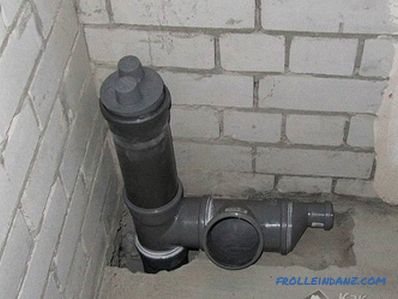 A funnel pipe
A funnel pipe
To ensure better sealing joints, ventilation pipe must be selected from the same material of which the sewage system is made. But basically, plastic pipe is chosen as a funnel stand.
If the sewage pipe is cast-iron, then to connect it with a plastic one, you can use an ordinary rubber cuff, which is inserted into the pipe and sealed with silicone. The diameter of the cuff should match the diameter of the pipe.
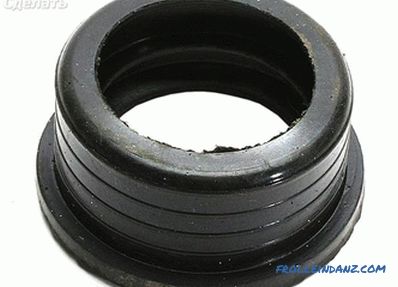 Rubber cuff for switching from cast iron to plastic The diameter of the pipe should be the same as the diameter of the largest riser - this is important. Often suitable plastic pipe Ø 110 mm. Before you make a ventilation system using a fan pipe, familiarize yourself with some of the rules:
Rubber cuff for switching from cast iron to plastic The diameter of the pipe should be the same as the diameter of the largest riser - this is important. Often suitable plastic pipe Ø 110 mm. Before you make a ventilation system using a fan pipe, familiarize yourself with some of the rules:
- The riser and the fan leads must be connected to one system. In the case when the individual risers are located far from each other, you need to install two pipes or more.
- In order to reduce the laboriousness of the work and to make the system more qualitative and more convenient, it is better to install the ventilation system with a funnel during the construction phase of the building.
- It is impossible to take the pipe to the attic, even if it is not used - odors will accumulate there. The end of the pipe should be displayed on the roof. The distance from the ridge varies from 0.3 m to 3 m, depending on the type of roof. If it is flat - 0.35 m is enough, if it is sloping - 0.5 m and more.
- If a chimney or ventilation pipes have already been brought to the roof, the fan pipe should be installed above all. In this case, the penetration of unpleasant odors into the room is excluded.
- The deflector can be put only in an area with a warm climate, as in cold regions it will freeze, becoming covered with ice.
Installation of the funnel
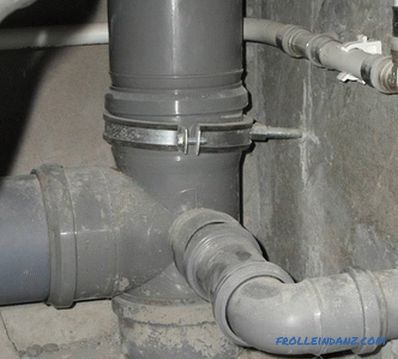
The first step is to determine where the pipe will be installed. When choosing, one should take into account that air circulation occurs due to temperature and pressure differences, therefore the pipe start should be located in a warm room, and the end should be in a cold one. Then you need to dock the ventilation pipe with the sewer. If your pipe is not at the base of the house, but is located on the floor, then all that remains is to cut a tee into it. If it is located in the basement, you need to get to it, and then also cut a tee.
Then everything is simple - we connect the pipe to the tee vertically. Our pipe will pass through the entire building to the roof. To fasten it, use metal clamps.
Metal fasteners are much safer and stronger. Moreover, they will allow you to adjust the design for the desired slope.
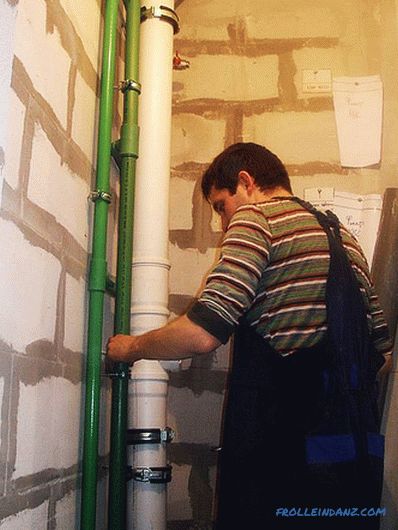 Fixing the pipes with metal clamps
Fixing the pipes with metal clamps
Clamps are attached to the wall along which the pipe goes. At the level of 1.5 m you need to put the inspection hatch in order to clean the pipe. In the ceiling or ceiling, depending on how many floors you have, you need to make holes for the pipe. After the pipe is fixed in the house, it needs to be brought to the roof. There are three options for how to install it:
- Vertically directly.
- At an angle of 45˚.
- At an angle of 90˚.
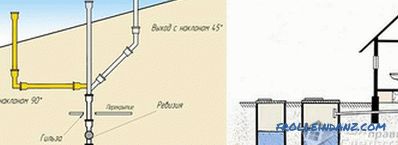 Entering the funnel pipe on the roof
Entering the funnel pipe on the roof
In order to bring the pipe vertically, additionally do not need anything. If you need to install it at an angle, you need to buy a special knee. The pipe is displayed under the ridge of the roof. After that, it remains only to carry out work on the roof. You need to fix the exit pipe fan, make a mortgage and put an umbrella.
Pipe can be lined with insulation. It will ensure not only the maintenance of the required temperature, but also play the role of sound insulation. After all the work is done, the pipe can be lined up with a box so that it is not visible. In the place where there is a revision, it is also necessary to make a hatch to ensure access to it.
Alternative method - vacuum valves
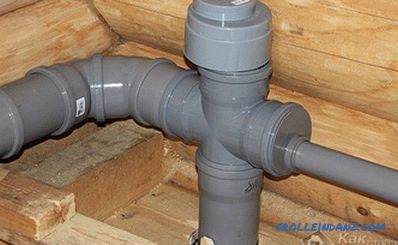 The vacuum valve is installed at the end of the second floor riser
The vacuum valve is installed at the end of the second floor riser
Another way to ensure the ventilation of sewers is to install valves. But it is worth choosing such an option when it is technically impossible or impractical to plan the pipe to be installed.
How does it work? The valve is equipped with a leaf that connects with a spring that has a slight resistance. If the device is in the closed state, a hermetic seal prevents air from entering. When a vacuum is created in the system, which can occur when the toilet is drained, the water is drained under pressure, or the water is drained from the washing machine by a pump, the valve opens automatically. Then the air in the room passes through the valve into the sewage system, restoring pressure. When the balance is restored, the sash takes a reverse position, hermetically blocking the access of air. In this state, sewer "odors" will not be able to penetrate into your room. And when the valve opens, the flow of air that is sucked into the system prevents the smell from seeping in.
But there are some nuances that should be considered when installing and using such equipment:
- as opposed to funnel pipes, vacuum valves cannot ensure the complete absence of sewage odor when the siphons dry;
- such equipment is installed on the sockets, but if for any reason it is difficult to install it there, it can be done on any horizontal pipe section of the sewer system;
- the main drawback of the valves is the wear of the rubber seals, which and make it airtight;
- n Equipment requires periodic maintenance: if you smell it, you need to open it and fix the problem.
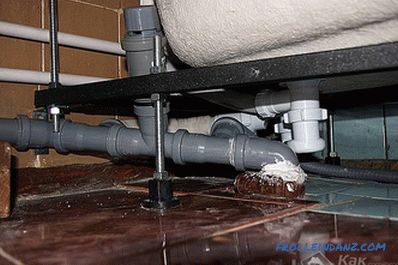 Vacuum valve behind the bathroom
Vacuum valve behind the bathroom
If we talk about installation, the process is simple, and , unlike the installation of a funnel pipe, no additional repair work is required. It is enough just to connect the valve with the sewage system and ensure good sealing of the joint. For this purpose, fit a normal rubber cuff.
Non-standard methods
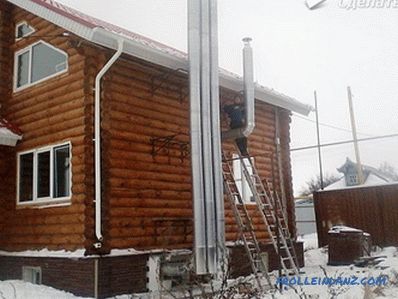 One of the options for installing ventilation channels
One of the options for installing ventilation channels
If your building already built, but you don’t want to make holes in the ceiling, you can resort to alternative methods that do not contradict the standard requirements and safety rules.
- Install the pipe on an external wall. This scheme is quite simple and similar to the classical system. It is necessary to install the pipe along the outer wall of the house. Its diameter should be 110 mm. It crashes into the sewer, is fastened with clamps to the wall and is displayed to the roof of the building. It is important not to install the pipe next to the windows and the balcony. Outwardly, such a system is very similar to a drain pipe, so it will not spoil the general appearance of the house at all. But in this case, it will need to be warmed, otherwise frosting is guaranteed.
- Installation of the system to the septic tank. This method can be considered the best option of these 3 methods. According to the rules, the storage and cleaning devices should be located 5-20 m from the dwelling. Therefore, having made ventilation to a septic tank, you can exclude hit of smells in the house. Moreover, the removal of the pipe from the septic tank is easy to do, both before and after the construction of the house.
- Installation of the system along the fence. The principle of installation is the same; the only difference is the remoteness of the ventilation outlet from the house.
By using such a system, you can harm your neighbors. So, if your fence is in close proximity to neighboring houses, the sewer odor will be heard.
Video
Photo
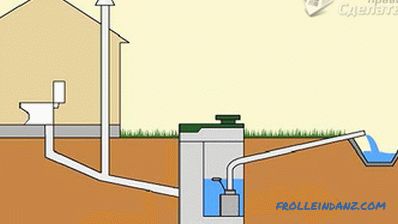 Discharge of the sewer pipe from the sewer
Discharge of the sewer pipe from the sewer
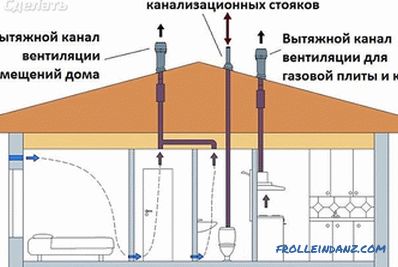 Ventilation risers in a country house
Ventilation risers in a country house
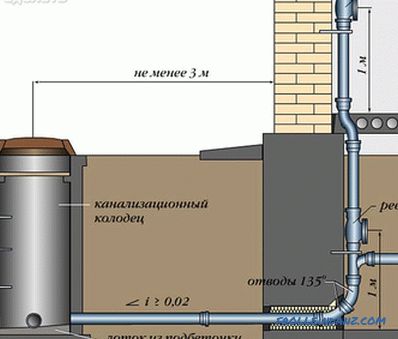 Scheme of the device of the sewer riser
Scheme of the device of the sewer riser
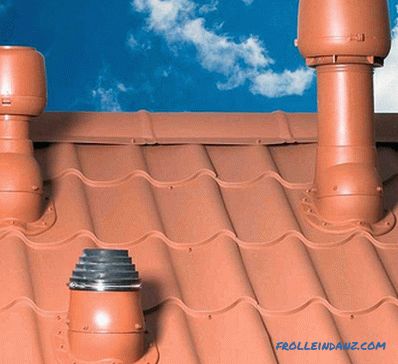
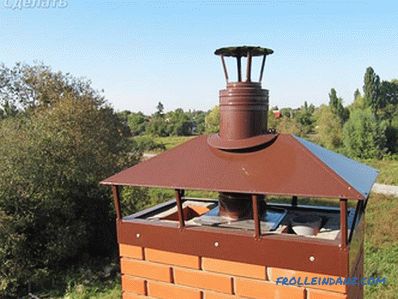 Derived on the roof ventilation pipe
Derived on the roof ventilation pipe
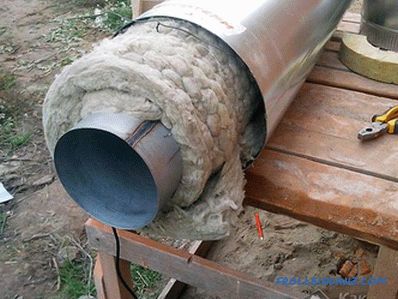 Insulation of the ventilation pipe
Insulation of the ventilation pipe
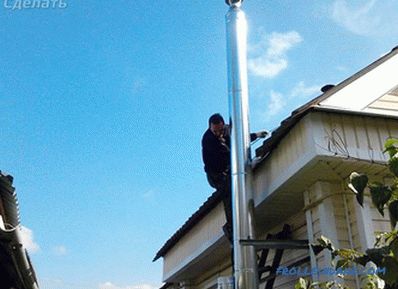 Installation of external heat-insulated ventilation
Installation of external heat-insulated ventilation
